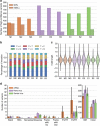Whole-genome mutational burden analysis of three pluripotency induction methods
- PMID: 26892726
- PMCID: PMC4762882
- DOI: 10.1038/ncomms10536
Whole-genome mutational burden analysis of three pluripotency induction methods
Abstract
There is concern that the stresses of inducing pluripotency may lead to deleterious DNA mutations in induced pluripotent stem cell (iPSC) lines, which would compromise their use for cell therapies. Here we report comparative genomic analysis of nine isogenic iPSC lines generated using three reprogramming methods: integrating retroviral vectors, non-integrating Sendai virus and synthetic mRNAs. We used whole-genome sequencing and de novo genome mapping to identify single-nucleotide variants, insertions and deletions, and structural variants. Our results show a moderate number of variants in the iPSCs that were not evident in the parental fibroblasts, which may result from reprogramming. There were only small differences in the total numbers and types of variants among different reprogramming methods. Most importantly, a thorough genomic analysis showed that the variants were generally benign. We conclude that the process of reprogramming is unlikely to introduce variants that would make the cells inappropriate for therapy.
Conflict of interest statement
H.D., Z.D., E.H.C., A.W.C.P. and H.C. are employees of BioNano Genomics, Inc.
Figures



References
-
- Hussein S. M. et al.. Copy number variation and selection during reprogramming to pluripotency. Nature 471, 58–62 (2011). - PubMed
-
- Mayshar Y. et al.. Identification and classification of chromosomal aberrations in human induced pluripotent stem cells. Cell Stem Cell 7, 521–531 (2010). - PubMed
-
- Taapken S. M. et al.. Karotypic abnormalities in human induced pluripotent stem cells and embryonic stem cells. Nat. Biotechnol. 29, 313–314 (2011). - PubMed
Publication types
MeSH terms
Grants and funding
LinkOut - more resources
Full Text Sources
Other Literature Sources
Research Materials

